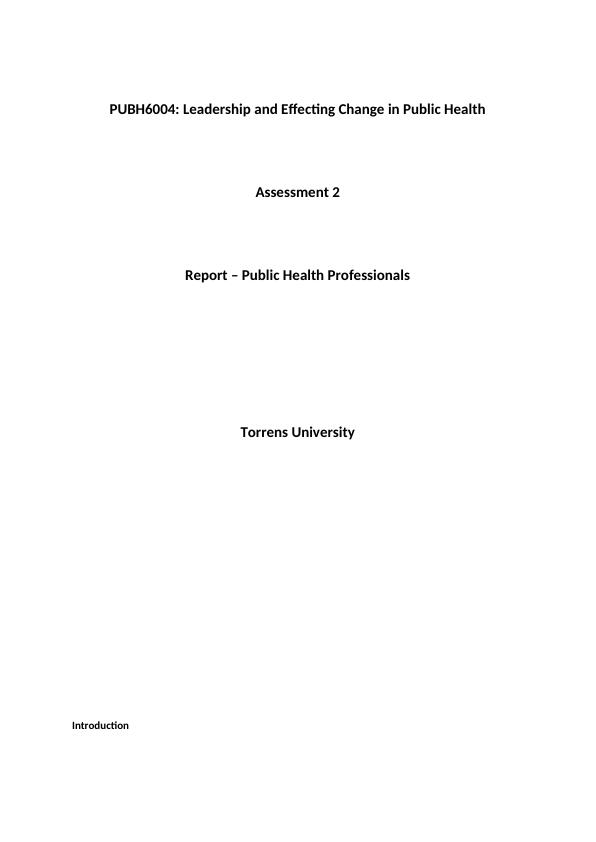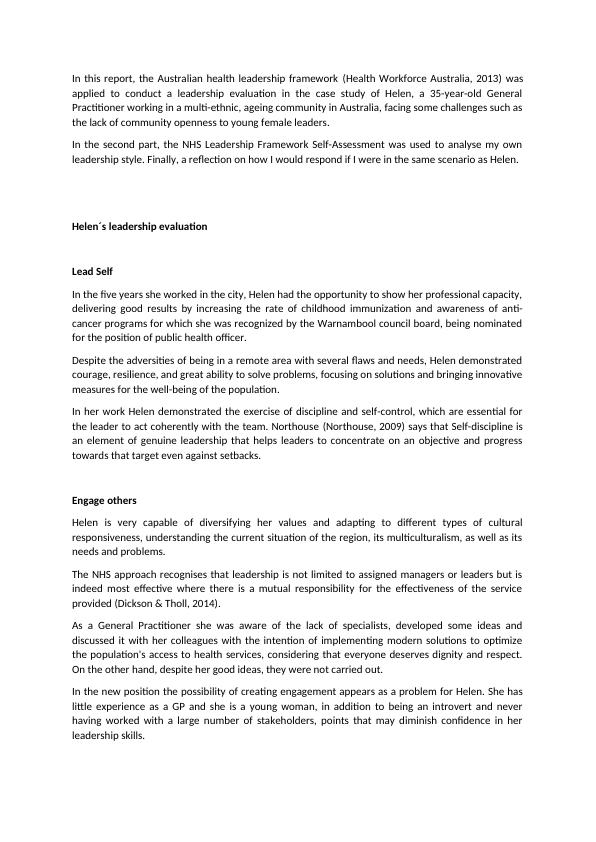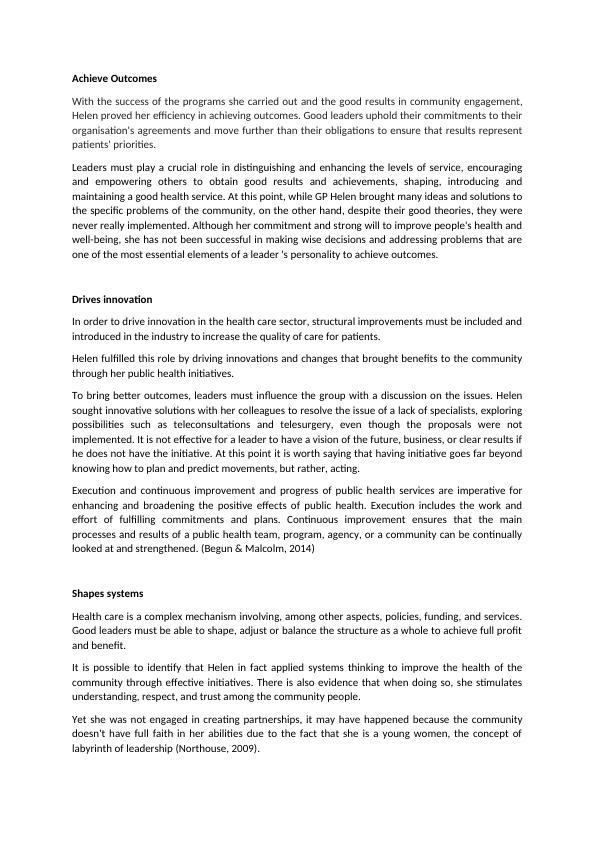Ask a question from expert
PUBH6004: Leadership and Effecting Change in Public Health
6 Pages2138 Words466 Views
Added on 2021-03-26
PUBH6004: Leadership and Effecting Change in Public Health
Added on 2021-03-26
BookmarkShareRelated Documents
PUBH6004: Leadership and Effecting Change in Public HealthAssessment 2Report – Public Health ProfessionalsTorrens UniversityIntroduction

In this report, the Australian health leadership framework (Health Workforce Australia, 2013) wasapplied to conduct a leadership evaluation in the case study of Helen, a 35-year-old GeneralPractitioner working in a multi-ethnic, ageing community in Australia, facing some challenges such asthe lack of community openness to young female leaders.In the second part, the NHS Leadership Framework Self-Assessment was used to analyse my ownleadership style. Finally, a reflection on how I would respond if I were in the same scenario as Helen.Helen ́s leadership evaluationLead SelfIn the five years she worked in the city, Helen had the opportunity to show her professional capacity,delivering good results by increasing the rate of childhood immunization and awareness of anti-cancer programs for which she was recognized by the Warnambool council board, being nominatedfor the position of public health officer.Despite the adversities of being in a remote area with several flaws and needs, Helen demonstratedcourage, resilience, and great ability to solve problems, focusing on solutions and bringing innovativemeasures for the well-being of the population.In her work Helen demonstrated the exercise of discipline and self-control, which are essential forthe leader to act coherently with the team. Northouse (Northouse, 2009)says that Self-discipline isan element of genuine leadership that helps leaders to concentrate on an objective and progresstowards that target even against setbacks.Engage othersHelen is very capable of diversifying her values and adapting to different types of culturalresponsiveness, understanding the current situation of the region, its multiculturalism, as well as itsneeds and problems.The NHS approach recognises that leadership is not limited to assigned managers or leaders but isindeed most effective where there is a mutual responsibility for the effectiveness of the serviceprovided (Dickson & Tholl, 2014).As a General Practitioner she was aware of the lack of specialists, developed some ideas anddiscussed it with her colleagues with the intention of implementing modern solutions to optimizethe population's access to health services, considering that everyone deserves dignity and respect.On the other hand, despite her good ideas, they were not carried out.In the new position the possibility of creating engagement appears as a problem for Helen. She haslittle experience as a GP and she is a young woman, in addition to being an introvert and neverhaving worked with a large number of stakeholders, points that may diminish confidence in herleadership skills.

Achieve OutcomesWith the success of the programs she carried out and the good results in community engagement,Helen proved her efficiency in achieving outcomes. Good leaders uphold their commitments to theirorganisation's agreements and move further than their obligations to ensure that results representpatients' priorities.Leaders must play a crucial role in distinguishing and enhancing the levels of service, encouragingand empowering others to obtain good results and achievements, shaping, introducing andmaintaining a good health service. At this point, while GP Helen brought many ideas and solutions tothe specific problems of the community, on the other hand, despite their good theories, they werenever really implemented. Although her commitment and strong will to improve people's health andwell-being, she has not been successful in making wise decisions and addressing problems that areone of the most essential elements of a leader 's personality to achieve outcomes.Drives innovationIn order to drive innovation in the health care sector, structural improvements must be included andintroduced in the industry to increase the quality of care for patients. Helen fulfilled this role by driving innovations and changes that brought benefits to the communitythrough her public health initiatives.To bring better outcomes, leaders must influence the group with a discussion on the issues. Helensought innovative solutions with her colleagues to resolve the issue of a lack of specialists, exploringpossibilities such as teleconsultations and telesurgery, even though the proposals were notimplemented. It is not effective for a leader to have a vision of the future, business, or clear results ifhe does not have the initiative. At this point it is worth saying that having initiative goes far beyondknowing how to plan and predict movements, but rather, acting.Execution and continuous improvement and progress of public health services are imperative forenhancing and broadening the positive effects of public health. Execution includes the work andeffort of fulfilling commitments and plans. Continuous improvement ensures that the mainprocesses and results of a public health team, program, agency, or a community can be continuallylooked at and strengthened. (Begun & Malcolm, 2014)Shapes systemsHealth care is a complex mechanism involving, among other aspects, policies, funding, and services.Good leaders must be able to shape, adjust or balance the structure as a whole to achieve full profitand benefit.It is possible to identify that Helen in fact applied systems thinking to improve the health of thecommunity through effective initiatives. There is also evidence that when doing so, she stimulatesunderstanding, respect, and trust among the community people.Yet she was not engaged in creating partnerships, it may have happened because the communitydoesn't have full faith in her abilities due to the fact that she is a young women, the concept oflabyrinth of leadership (Northouse, 2009).

End of preview
Want to access all the pages? Upload your documents or become a member.
Related Documents
Leadership and Effecting Change in Public Healthlg...
|10
|2203
|369
Leadership and Effecting Change in Public Healthlg...
|10
|2692
|67
Leadership and Effecting Change in Public Healthlg...
|12
|3022
|339
Leadership Management in Public Healthlg...
|17
|2489
|43
Australian Public Health Professionalslg...
|11
|2997
|393
Leadership Change in Public Healthlg...
|10
|2978
|17